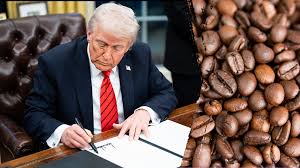Reps. Ro Khanna (D-Calif.) and Don Bacon (R-Neb.) sent a bipartisan letter to President Trump this week asking him to exempt coffee from his reciprocal tariff program, arguing that the levies are driving up consumer prices for a product the U.S. barely produces.
Coffee inflation is striking: consumer prices were up 20.9% year-over-year in August, per the CPI. In their letter, Khanna and Bacon asked the administration to add coffee — both green beans and roasted/ground products — to Annex II of Executive Order 14257 so it’s excluded from the administration’s universal reciprocal tariffs. They noted Americans drink roughly 400 million cups of coffee a day and that domestic production accounts for less than 1% of U.S. consumption (mostly specialty beans from Hawaii and Puerto Rico).
The lawmakers argued tariffs won’t protect U.S. growers — there simply aren’t large-scale domestic alternatives — but will act as “an additional tax on American consumers,” squeezing cafes, small businesses and everyday drinkers. Khanna said he’s heard from small coffee shops and hospitality workers who are already feeling pressure and could be forced out of business if costs keep rising.
Khanna and Bacon also introduced the “No Coffee Tax Act” last month to repeal the administration’s coffee tariffs. The pair previously traveled to Mexico to push for a more constructive approach to the tariff policy and stressed the issue’s practical, constituent impact: “There is no American alternative to coffee,” Bacon said. “Why tariff something we can’t grow?”
A White House spokesperson pushed back. Kush Desai told Fox News Digital that Khanna “doesn’t know what he’s talking about,” saying the president already excluded some goods from tariff treatment and blaming global supply problems — not tariffs — for near-historic coffee prices.
The bipartisan plea underscores a broader debate over the administration’s tariff strategy and its fallout for everyday consumers and businesses that rely on imported goods the U.S. does not meaningfully produce.
